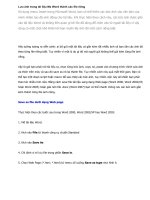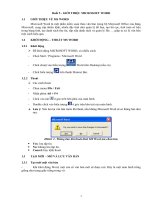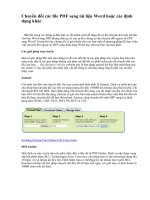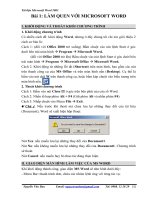Tài liệu WORD ORDER
Bạn đang xem bản rút gọn của tài liệu. Xem và tải ngay bản đầy đủ của tài liệu tại đây (117.81 KB, 10 trang )
Word Order in English Sentences
In the English language there are no different forms for subjects and objects. To keep
subject and object apart, however, we have to stick to the word order.
Explanations and Exercises
Word Order in Positive Sentences
Word Order in Negative Sentences
Word Order in Subordinate Clauses
Position of Time Expressions
Position of Adverbs
Word Order in Questions
Word Order in Positive Sentences
For the beginning, remember this simple rule:
subject verb(s) object
I speak English
I can speak English
If you are a more advanced learner, remember the following rule:
subject verb(s9 indirect object direct object place time
I will tell you the story at school tomorrow.
Exercises on English Word Order
Word Order in Affirmative Sentences 1
Arrange the words to make affirmative sentences.
1. like / I / you →
I like you.
2. French / I / speak →
3. hates / pigeons / he →
4. they / song / a / sing →
5. sell / flowers / we →
6. you / see / me / can →
7. buy / milk / he / wants to →
8. feed / you / my / cat / can →
9. sister / has / my / got / a dog →
10. must / the book / read / you →
Exercises on English Word Order
Word Order in affirmative Sentences 2
Arrange the words to make affirmative sentences. Place time expressions at the end of the
sentences.
1. go / now / home / will / I →
I w ill go hom
2. give / the present / tomorrow / we / him / will →
3. her / met / last night / at / we / the station →
4. was / last week / he / in hospital →
5. in Greece / spend / I / will / next year / my holiday →
6. must / at five o'clock / leave / we / the house →
7. the library / take / I / the book / will / today / to →
8. my mum / breakfast / in the morning / made →
9. tonight / want / to the cinema / to go / we →
10. wrote / last week / they / at school / a test →
Word Order in Negative Sentences
The word order in negative sentences is the same as in affirmative sentences. Note,
however, that in negative sentences we usually need an auxiliary verb:
subject verbs indirect object direct object place time
I will not tell you the story at school tomorrow.
Exercises on English Word Order
Word Order in Negative Sentences
Arrange the words to make negative sentences. Place time expressions at the end of the
sentences.
1. our holiday / will / at home / we / not / spend / next year
→
We w ill not
2. did / I / him / see / not / last night / at the disco
→
3. to a party / not / we / tonight / going / are
→
4. will / a letter / not / next week / send / you / she
→
5. not / the truth / did / he / tell / you
→
6. to the cinema / we / want / not / do / tonight / to go
→
7. play / in the bar / did / he / last week / not / the piano
→
8. not / now / she / in England / is
→
9. eat / in winter / ice-cream / do / not / I
→
10.right now / have / not / we / time / do
→
Word Order in Subordinate Clauses
In subordinate clauses, the word order is the same as in simple affirmative sentences.
(Conjunctions are often used between two clauses):
conjunction subject verb(s) indirect object direct object place time
I will tell you the story at school tomorrow ...
because I don't have time now.
Exercises on English Word Order
Subordinate Clauses
Complete the sentences with the words in brackets. Place time expressions at the end of the
sentences.
1. She is in great form because (every week / goes / she / to the gym)
she goes to
.
2. I think (likes / Susan / you) .
3. I can't talk to you because (time / do not have / I / now) .
4. We are glad that (at home / did not leave / we / our umbrella .
5. I will miss him when (to Chicago / moves / he) .
6. They don't know where (have left / the key / they) .
7. Ring me if (have / you / a problem) .
8. I'd like to know why (her holiday / does not spend / she / in France .
9. They told him that (wanted to play / they / tennis) .
10.He was reading the paper while (she / in the garden / was working) .
Position of Time Expressions
(e.g.: recently, now, then, yesterday)
Adverbs of time are usually put at the end of the sentence.
subject verb(s) indirect object direct object time
I will tell you the story tomorrow.
If you don't want to put emphasis on the time, you can also put the adverb of time at the
beginning of the sentence.
time subject verb(s) indirect object direct object
Tomorrow I will tell you the story.
Note that some time expressions are adverbs of frequency (always, never, usually usw.).
These are usually put before the main verb (except for 'be' as a main verb). (see also
Position of Adverbs)
subject auxiliary/be adverb main verb object, place or time
I often go swimming in the evenings.
He doesn't always play tennis.
We are usually here in summer.
I have never been abroad.
Position of Time Expressions
Decide where to place the time expressions. (The sentences are similar to allow you to
concentrate on the time expressions.)
1. We went to the cinema yesterday.
We went yesterday to the cinema.
Both sentences are correct.
2. We often go to the cinema.
We go often to the cinema.
Both sentences are correct.
3. Next Tuesday I will go to the cinema.
I will go to the cinema next Tuesday.
Both sentences are correct.
4. They never go to the cinema.
They go to the cinema never.
Both sentences are correct.
5. She goes every Sunday to the cinema.
She goes to the cinema every Sunday.
Both sentences are correct.
6. I seldom am at the cinema.
I am seldom at the cinema.
Both sentences are correct.
7. I don't go to the cinema every week.
I don't go every week to the cinema.
Both sentences are correct.









